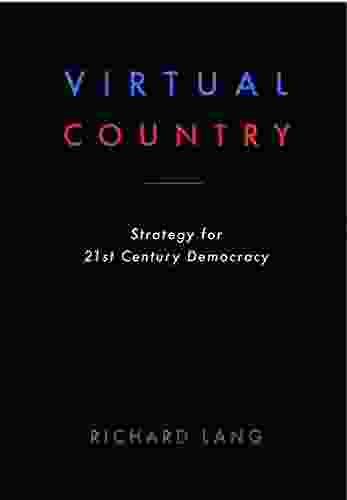The Virtual Country Strategy: A Path to 21st Century Democracy

In the 21st century, democracy is facing new challenges. The rise of social media and the internet has created a new public sphere where misinformation and hate speech can spread like wildfire. Traditional forms of media are struggling to keep up, and the public is increasingly distrustful of institutions. In this environment, it is more important than ever to find new ways to engage citizens and build a more democratic society.
One promising approach is the virtual country strategy. The virtual country strategy is a way to use technology to create a more inclusive and participatory democracy. It involves creating a virtual space where citizens can come together to discuss issues, make decisions, and hold their leaders accountable. Virtual countries can be used to supplement or even replace traditional forms of government, and they can be particularly effective in countries where there is a lack of trust in the government or where there are barriers to political participation.
There are many different ways to implement a virtual country strategy. One common approach is to create a virtual world that simulates a real-world country. In this virtual world, citizens can create their own avatars and interact with each other through text, voice, and video. They can also participate in elections, serve on juries, and even run for office. Virtual worlds can be a powerful tool for engaging citizens and teaching them about the democratic process.
Another approach to the virtual country strategy is to create a virtual platform where citizens can discuss issues and make decisions. This type of platform can be used to supplement or even replace traditional forms of town hall meetings or public hearings. Virtual platforms can be more inclusive than traditional forms of public engagement, as they allow people to participate from anywhere in the world. They can also be more transparent, as all of the discussions and decisions are recorded and available for public scrutiny.
The virtual country strategy is a promising approach to addressing the challenges facing democracy in the 21st century. It has the potential to create a more inclusive, participatory, and transparent democracy. However, it is important to note that the virtual country strategy is not a panacea. It is only one tool that can be used to build a more democratic society. In order to be effective, the virtual country strategy must be implemented in a way that is tailored to the specific needs of each country. It must also be complemented by other reforms, such as campaign finance reform and media reform.
Benefits of the Virtual Country Strategy
There are many benefits to the virtual country strategy. Some of the most important benefits include:
- Increased citizen engagement: Virtual countries can make it easier for citizens to participate in the democratic process. They can provide a space for citizens to discuss issues, make decisions, and hold their leaders accountable. This can lead to a more informed and engaged citizenry.
- Increased transparency: Virtual countries can be more transparent than traditional forms of government. All of the discussions and decisions that take place in a virtual country are recorded and available for public scrutiny. This can help to build trust between citizens and their government.
- Increased inclusivity: Virtual countries can be more inclusive than traditional forms of government. They allow people to participate from anywhere in the world, regardless of their physical abilities or socioeconomic status. This can help to create a more diverse and representative democracy.
- Reduced costs: Virtual countries can be less expensive to operate than traditional forms of government. They do not require the same level of infrastructure and staff, and they can be scaled up or down depending on the needs of the community.
Challenges of the Virtual Country Strategy
There are also some challenges to implementing the virtual country strategy. Some of the most important challenges include:
- The digital divide: Not everyone has access to the internet or the devices needed to participate in a virtual country. This can create a digital divide between those who can and cannot participate in the democratic process.
- Security: Virtual countries can be vulnerable to hacking and other security threats. This can compromise the privacy of citizens and the integrity of the democratic process.
- Governance: Virtual countries need to be governed in a way that is fair and transparent. This can be a challenge, as there is no clear precedent for how to govern a virtual world.
- Sustainability: Virtual countries need to be sustainable in the long term. This means that they need to have a plan for how to fund their operations and how to adapt to changing circumstances.
The virtual country strategy is a promising approach to addressing the challenges facing democracy in the 21st century. It has the potential to create a more inclusive, participatory, and transparent democracy. However, it is important to note that the virtual country strategy is not a panacea. It is only one tool that can be used to build a more democratic society. In order to be effective, the virtual country strategy must be implemented in a way that is tailored to the specific needs of each country. It must also be complemented by other reforms, such as campaign finance reform and media reform.
Do you want to contribute by writing guest posts on this blog?
Please contact us and send us a resume of previous articles that you have written.
 Book
Book Novel
Novel Page
Page Genre
Genre Reader
Reader Magazine
Magazine Paragraph
Paragraph Bookmark
Bookmark Shelf
Shelf Glossary
Glossary Bibliography
Bibliography Synopsis
Synopsis Annotation
Annotation Footnote
Footnote Manuscript
Manuscript Scroll
Scroll Codex
Codex Bestseller
Bestseller Classics
Classics Narrative
Narrative Autobiography
Autobiography Reference
Reference Encyclopedia
Encyclopedia Dictionary
Dictionary Thesaurus
Thesaurus Narrator
Narrator Character
Character Resolution
Resolution Catalog
Catalog Card Catalog
Card Catalog Archives
Archives Periodicals
Periodicals Scholarly
Scholarly Academic
Academic Journals
Journals Rare Books
Rare Books Literacy
Literacy Awards
Awards Reading List
Reading List Theory
Theory Walter Bagehot
Walter Bagehot Carina Frei
Carina Frei Sasha Geffen
Sasha Geffen Anita Lasker Wallfisch
Anita Lasker Wallfisch Gayle G Roper
Gayle G Roper Patricia L Woodard
Patricia L Woodard Lisa Fortini Campbell
Lisa Fortini Campbell Lilly Jones
Lilly Jones Any Cherubim
Any Cherubim H J Marshall
H J Marshall Lilian Jackson Braun
Lilian Jackson Braun Hieu Minh Nguyen
Hieu Minh Nguyen T L Sanders
T L Sanders Philip C Jackson
Philip C Jackson Michel Bussi
Michel Bussi Nathan Van Coops
Nathan Van Coops Robert Snedden
Robert Snedden Lea M Mcgee
Lea M Mcgee Jean Leinhauser
Jean Leinhauser Luanne C Brown
Luanne C Brown
Light bulbAdvertise smarter! Our strategic ad space ensures maximum exposure. Reserve your spot today!

 George R.R. Martin100 Jazz Patterns for Chromatic Harmonica: A Comprehensive Guide by Yvonnick...
George R.R. Martin100 Jazz Patterns for Chromatic Harmonica: A Comprehensive Guide by Yvonnick...
 Percy Bysshe ShelleyDrone Girls and the Air Show Adventure: Soaring into the Future of STEM and...
Percy Bysshe ShelleyDrone Girls and the Air Show Adventure: Soaring into the Future of STEM and...
 Drew BellComplications in Neurosurgery: An Expert's Perspective by Dr. Anil Nanda, MD,...
Drew BellComplications in Neurosurgery: An Expert's Perspective by Dr. Anil Nanda, MD,... Paulo CoelhoFollow ·10.5k
Paulo CoelhoFollow ·10.5k Darnell MitchellFollow ·14.6k
Darnell MitchellFollow ·14.6k Bill GrantFollow ·15.5k
Bill GrantFollow ·15.5k Harold BlairFollow ·3.4k
Harold BlairFollow ·3.4k Alex ReedFollow ·12.5k
Alex ReedFollow ·12.5k Clark BellFollow ·16.1k
Clark BellFollow ·16.1k Mike HayesFollow ·18.7k
Mike HayesFollow ·18.7k Craig CarterFollow ·6.6k
Craig CarterFollow ·6.6k

 Braden Ward
Braden WardFeminism's Forgotten Fight: The Ongoing Battle for...
The feminist movement has historically...

 Julio Cortázar
Julio CortázarBlue Heaven Black Night: A Literary Journey Through Love,...
In the realm of...

 Eddie Bell
Eddie BellA Journey Through Time: Exploring the Enchanting World of...
The vibrant tapestry of New...

 Lawrence Bell
Lawrence BellValiance Dragon Soul Press Anthology: A Literary Odyssey...
Step into a realm where...

 Aron Cox
Aron CoxEmbark on a Creative Odyssey with Jean Leinhauser's "101...
Unveil a Kaleidoscope of...








